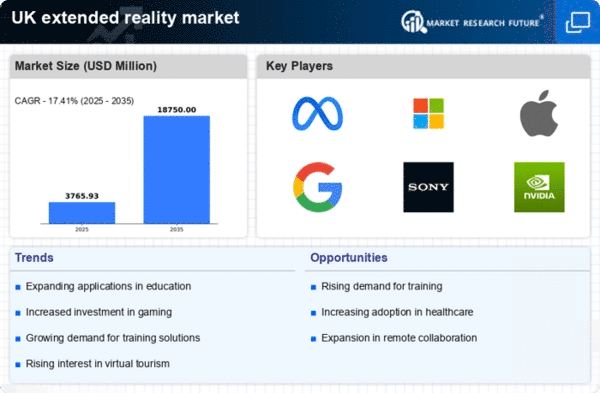Technological Advancements in Hardware
The extended reality market is experiencing a surge in technological advancements in hardware, which is likely to enhance user experiences significantly. Innovations in headsets, sensors, and display technologies are making extended reality applications more accessible and immersive. For instance, the introduction of lightweight, high-resolution headsets is expected to drive adoption across various sectors. In the UK, the market for augmented reality (AR) and virtual reality (VR) hardware is projected to reach £1.5 billion by 2026, indicating a robust growth trajectory. These advancements not only improve the quality of experiences but also reduce costs, making it feasible for businesses to integrate extended reality solutions into their operations.
Integration of Extended Reality in Education
The integration of extended reality technologies in education is emerging as a powerful driver for the extended reality market. Educational institutions in the UK are increasingly adopting AR and VR to create engaging learning experiences. This trend is supported by research indicating that immersive learning can improve retention rates by up to 75%. As schools and universities seek innovative ways to enhance student engagement, the demand for extended reality applications is expected to rise. The education sector's investment in these technologies could potentially reach £500 million by 2027, underscoring the significant role of extended reality in transforming educational methodologies.
Growing Demand for Remote Collaboration Tools
The demand for remote collaboration tools is significantly influencing the extended reality market. As businesses in the UK increasingly adopt hybrid work models, the need for effective virtual collaboration solutions has become paramount. Extended reality technologies offer immersive environments that facilitate real-time collaboration, enhancing productivity and engagement among remote teams. Market analysis indicates that the remote collaboration software market is projected to grow by 25% annually, with extended reality solutions playing a pivotal role in this expansion. This trend suggests that companies are likely to invest in extended reality tools to improve communication and teamwork, thereby driving market growth.
Increased Investment in Research and Development
Investment in research and development (R&D) within the extended reality market is a critical driver of growth. Companies are allocating substantial resources to explore new applications and improve existing technologies. In the UK, R&D spending in the tech sector has seen a notable increase, with estimates suggesting that it could reach £20 billion annually by 2025. This influx of capital is likely to foster innovation, leading to the development of more sophisticated extended reality applications. As businesses recognize the potential of these technologies, the demand for R&D-driven solutions is expected to rise, further propelling the extended reality market forward.
Expansion of Gaming and Entertainment Applications
The gaming and entertainment sectors are pivotal in driving the extended reality market. With the UK being home to a vibrant gaming industry, the demand for immersive gaming experiences is on the rise. The market for VR gaming alone is projected to exceed £1 billion by 2025, reflecting a growing consumer appetite for innovative entertainment options. Additionally, the integration of extended reality in live events and theme parks is likely to enhance audience engagement. As companies continue to explore creative applications of extended reality in entertainment, this sector is expected to remain a key contributor to the overall growth of the extended reality market.
















